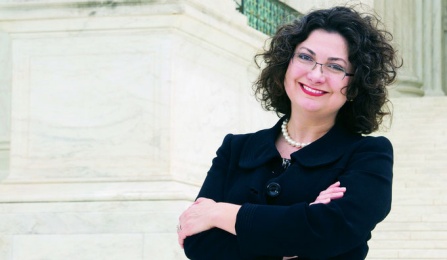Law Links - October 2014
Law School leads state in Pro Bono Scholars Program

Four of the 12 Pro Bono Scholars will staff the law school’s new Health Justice Law & Policy Clinic, led by instructor and clinical teaching fellow Danielle Pelfrey Duryea.
The Law School is getting ready to recognize National Pro Bono Celebration the week of October 19-25, 2014, by launching its new Pro Bono Scholars Program.
This year, SUNY Buffalo Law School leads the state in placing a dozen students in the statewide– including those who will work in a new Law School medical-legal partnership law clinic focusing on legal needs of those facing medical challenges.
Last year was the first time prospective new lawyers new lawyers had to provide 50 hours of pro bono service hours to gain admission to the New York bar. Four of the 12 Pro Bono Scholars will staff the new clinic, to be led by clinical teaching fellow Danielle Pelfrey Duryea.
The other eight Pro Bono Scholars will be assigned in pairs to four providers of legal advice to underserved clients: Volunteer Lawyers Project; Neighborhood Legal Services; Legal Services for the Elderly, Disabled or Disadvantaged of Western New York; and Legal Aid.
Professor Kim Diana Connolly, who serves as the Law School’s vice dean for legal skills and director of Clinical Legal Education, chairs SUNY Buffalo Law’s Pro Bono Scholars Program Committee. “We had one of the largest groups of applicants of any law school in the state, if not the largest,” Connolly said. “We selected 12 scholars who we believe are committed to pro bono work and whose records demonstrate a strong likelihood of providing excellent service to underserved clients.” Connolly notes that the 12 students chosen for the program represent the largest group of any law school in New York.
The Pro Bono Scholars Program was announced last spring by the state’s chief judge, Hon. Jonathan Lippman. In addition to fulfilling their requirement for 50 hours of pro bono legal service before applying for admission to the bar, the program allows scholars to accelerate the pace at which they can enter the legal market as licensed attorneys. This is because Pro Bono Scholars take the bar exam in February of their third year of law school, before devoting their final semester to an intensive placement in a pro bono legal setting.
Students in the program will work at least 500 hours between March and May, said Lisa A. Bauer, the Law School’s director of externship programs. They will also enroll in a seminar on poverty law, taught by Connolly and Bauer.
“The goal is to instill in them a commitment to providing access to legal care,” Bauer said. “We have a good mix with the new clinic and these outside placements.” The Pro Bono Scholars, she said, will work in the community, under the supervision of practicing lawyers, on issues including medical-legal partnership work, housing, immigration, unemployment benefits, HIV/AIDS benefits and family law, and likely will staff help desks in courts including Family Court, Housing Court and U.S. District Court. They may also pursue opportunities to work on larger projects; for example, Neighborhood Legal Services is studying the Affordable Care Act and its effect on services used by the agency’s clients, and other community partners are working with local agencies on systematic and interdisplinary methods to address the legal needs of those facing medical challenges.
The participating students are Chidera Atuegbu, Alison Camp, Beatrice Costanzo, Molly Deacon, Ann Dillon, Jeffrey Donigan, Carin Gordon, Shannon Howley, Artur Jagielski, Anne Modica, Jillian Nowak and Dominic Pompo.